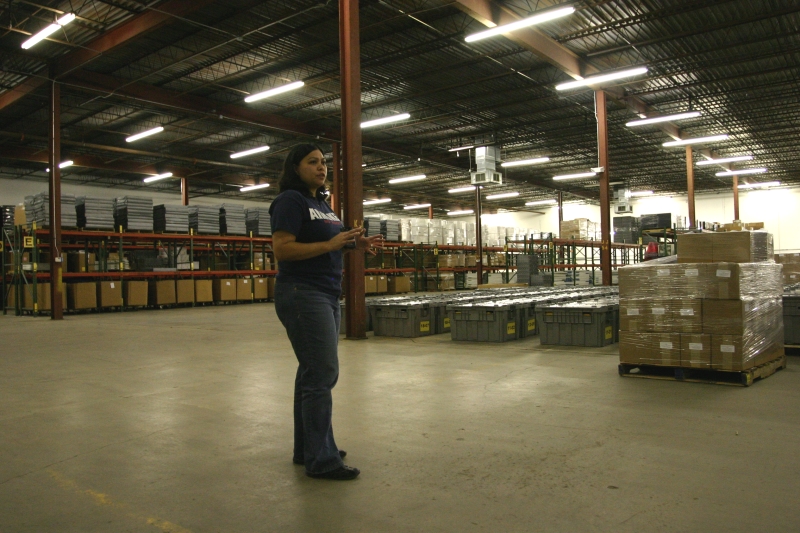In early July, Brenda Baker was working 70-hour weeks to organize a 38,000-square-foot warehouse from scratch. Now, it’s organized.
She’s still working overtime every day.
Baker is a salaried employee of the Wake County Board of Elections, so it’s not reflected in her pay.
“If I have to put in 20 or 30 hours a week of overtime, because an hourly person can’t, I will,” she said.
The Wake County Board of Elections has a legal obligation to conduct a “safe, secure, fair and honest election.” But, the resources it has to provide those fair elections are stretched thin. For the first time in recent history, the County Commission denied the Board of Elections the amount of money it requested.
With a trimmed budget, the board has to strictly limit overtime. It’s common for the salaried employees to work 60 to 80 hours per week just for the board to pick up the slack in the workload.
“We only have one chance to get it right,” Baker said. “You have no choice but to get it done.”
State and federal grants helped the board bridge prior funding gaps. Now those are gone.
“It’s hard to quantify or qualify the cuts we’ve made,” said Gary Sims, deputy director of the Wake County Board of Elections. “We’ve really hit our saturation points.”

Brenda Baker stands in the organized Wake County Elections warehouse.
“Every time you see somebody choose not to vote because of a long line, it’s a problem.”
One of the biggest blows to the Board of Elections, Sims said, was not being able to create new precincts. In June, County Commissioners denied the board’s request to fund the creation of 12 new precincts, instead funding two.
Baker said she “spent six months on the road” to draw those new precincts. That meant working with GIS mapping staff at the county, coordinating with potential polling places and working out of her car with a colleague.
“We put a lot of time, effort and work into that,” she said. “Everything else got put on hold.”
Elections staff felt it was essential to create the new precincts and corresponding polling places because of overcrowding.
“Every time you see someone choose not to vote because of a long line, it’s a problem,” Sims said.
But County Commissioners insisted that won’t be a problem for municipal elections this year.
“There’s not going to be a shortage of sites and there’s not going to be any lines,” Commissioner Joe Bryan said. “I find it hard to believe.”
Sims agrees. He’s worried about next year. The general election comes in November, with May primaries. The county budget year is June 1, 2011 through July 30, 2012. That means the current budget and precincts don’t apply to the general elections, but they do apply to the primaries.
Sims and his staff could ask for new precincts again before the 2012 general elections, but even if they get them, it would send many voters to a different polling place in November than the one they visited during the primaries.
“This year was a golden opportunity,” Sims said of creating the new precincts.
Even if they wanted to, he’s doubtful whether staff members will have the time to repeat all the work necessary to come up with a new precinct plan to present to the County Commission before the general elections.
Unstoppable Force, Immovable Object
“We’re all having to do more with less,” Commissioner Bryan said. “Human services will say ‘there is more people in need now and we need more money to provide for them.’ The same is true for lots of departments.”
Sims said he knows they’re “not more special than other departments.”
But, he said, “We can’t make mistakes. If we make mistakes, well, if nothing else, I’m going to lose my job.”
Having properly-sized precincts with well-staffed and resourced polling places is just part of the battle. But, Sims said, it’s a very important one.
“The commissioners do recognize the need for precincts. They do recognize growth,” Sims said. “I think it was a decision based on ‘we don’t have the money…’ We’re doing our job and they’re doing theirs. It’s opposing forces.”
“Not your typical government employees”
“Elections are something we all hold dear to our hearts,” Baker said, as she showed us around the clean and well-organized warehouse. She drives an hour to and from Granville County to get to work. When she gets home at night she often begins working again.
“It’s commendable,” Bryan said. “It’s what we expect from our government employees and it’s what people in the private sector are doing also. People are lucky to have a job right now… We’re lucky to have these people who will sacrifice.”
Sims thinks Wake voters are lucky, too.
“They’re not your typical government staff,” he said. “We’re very passionate about our jobs.”
“I have never seen this level of dedication,” Baker said of her co-workers. “We’ll work seven days a week if we have to.”
